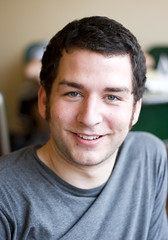3 Impacts Part Two
So I realize that Abu Ghraib has faded from the news a little bit and perhaps this essay's current-events value has decreased dramatically, but I haven't had time to blog much lately and I said I'd finish this thing, so here is the second impact for you all:
2: The Horrors of War
Under his helmet, up against his pack,
After so many days of work and waking,
Sleep took him by the brow and laid him back.
There, in the happy no-time of his sleeping,
Death took him by the heart. There heaved a quaking
Of the aborted life within him leaping,
Then chest and sleepy arms once more fell slack.
And soon the slow, stray blood came creeping
From the intruding lead, like ants on track.
- Wilfred Owen, “Asleep”
Throughout history, one of the artist’s primary duties during wartime has been to render the reality of the horror of war. Homer’s Iliad (perhaps you’ve seen the movie?) is filled with graphic and disturbing descriptions of disemboweling and other battlefield mutations. The Bible is one of the most graphic books around, and contains within it one of the few instances of a people recording their own genocide in the Book of Joshua. Pistol in Shakespeare’s “Henry V” is given the job of explaining to the audience that the patriotic battles they’ve seen have a terrible cost in human lives and souls.
Wilfred Owen was just a young man when he died during World War I. Despite his youth, he left behind him a cache of poems that elucidate the horrors of war better than any photograph. In reading his “Dulce Et Decorum Est” or the callous irony of “The Last Laugh” one cannot help but be struck by how dehumanizing the day to day life of a soldier is. “War is hell” is a cliché, but that doesn’t make it any less true. War is hell, and all involved are casualties, be they actual dead or walking wounded.
We have been spared this. We have been shielded from the consequences of the actions done in our names. This is beginning to change, and change fast. According to Frank Rich in this Sunday’s New York Times, Michael Moore’s new film will show us all the mutilations of our troops, the blood and gore of our soldiers that our government and self-censoring media have kept from us. We will see what the war is doing to our sons and daughters.
Abu Ghraib is a shock to our system in a very similar way. It brings the hell of war home in a way nothing else has thus far. The photos of flag draped coffins are beautiful in their solemnity. The photographs of stacked up naked men with smiling cherubic soldiers flanking them are neither solemn nor beautiful. They are parodies of everything war is supposed to be: all of the hell, none of the dignity.
The Bush Administration has done its best to keep knowledge of consequences as far away from our minds as possible. By not asking us to sacrifice anything (indeed, we couldn’t find the strength to even repeal a single tax cut!) or to change our lives in any way, shape or form, this administration has told us to not think about the war in any concrete or critical way. By not bringing it home to the citizens of this country, we are allowed the psychic space to avoid the cost of our government’s actions.
Besides shielding us from any real burden, the administration and its apologists have sought to limit our knowledge of things going wrong. This effort has led to the massive credibility gap between what Bush says and what the American public’s perception of reality is. He’d like to blame it on the media, but it is his own efforts to white wash the war that have cost him dearly at the polls.
I’ve already discussed how the soldiers in the pictures could be anybody. When the pictures remind us of the horrors of war it is because we realize that the captives could be anybody too. This everymanness is reinforced by the hoods over their heads and the blurring out of all distinctive characteristics. Looking at the pictures, it is easy to think that in this day and age when nothing is certain it could be someday be yourself under that hood, being strapped to electrodes, having dogs maul your genitals, being water boarded, stripped naked, anally raped.
Once we enter that particular circle of waking hell, we are left to reckon with the morning paper. The papers are filled with euphemisms for torture, calling it “abuse” or naming the specific industry term for the tactic used. This linguistic distance is no longer available to us, however, because we’ve had the images of their meaning burned into our minds. When we see “casualty” we now have graphic representations of the casualty. Not flag draped patriotism, but rather a rotting body in a bag, covered in ice, a smiling soldier posing as if in front of the Empire State Building.


0 Comments:
Post a Comment
<< Home